, The Preparedness Pro
One of the things that I enjoy most about the beginnings of a new year is laying out my list of library books to study that year based on what  my new targeted aspect of self-reliance is for that year. For example, this past year my goal was to master auricular therapy and to at least try my hand at raised garden beds. This year I want to master making artisan breads and some other alternative health care modalities. So I mosey over to Amazon and do some looking around based on my chosen topics, add the library books to my wish list and purchase them throughout the year. (I frequently purchase used library books because they are can be significantly less than the new ones and in great condition.)
my new targeted aspect of self-reliance is for that year. For example, this past year my goal was to master auricular therapy and to at least try my hand at raised garden beds. This year I want to master making artisan breads and some other alternative health care modalities. So I mosey over to Amazon and do some looking around based on my chosen topics, add the library books to my wish list and purchase them throughout the year. (I frequently purchase used library books because they are can be significantly less than the new ones and in great condition.)
Preparedness Library
Anyway, I’ve frequently been asked for my suggested reading list for preparedness. So I thought I’d provide for you a peek at my “library” of books that I recommend reading. All of these books in my library have been read and referenced by me over the years so that I can learn more about creating a self-reliant life. I highlight them and then put post-it tabs on the pages that I want to be able to quick reference. They are definitely well loved and highly valued in this household. It’s no wonder that this year Santa did something a little different and loaded up my stocking (which are huge in my family) with all kinds of books from my Wish List on Amazon.com I nearly didn’t get my presents opened and I just wanted to push the pause button on life and immerse myself in their pages for a couple of months. By the way, I’ve also enjoyed some of the recommendations that my readers have given me over the years, too. So long as they are void of raunchy dialog and are 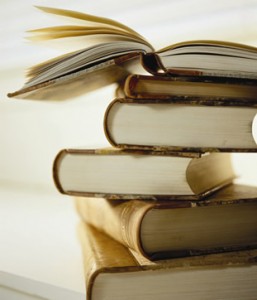 well-written, I’m all for discovering another great book I can add to my library.
well-written, I’m all for discovering another great book I can add to my library.
Understand the most important aspect of the principle of Mental Preparedness is that you prepare yourself with factual and reliable information. The culture of “fact checking” in the world of publishing has definitely declined over the last 10 years and so just because a book is in print, doesn’t mean it’s worth our while. Not that I presume to know about every single resource available on the topic of preparedness, but if you don’t see it here, there’s a strong likelihood it’s not here because I didn’t find it worthy of time or reliance.
While I do live right smack dab in the middle of the “preparedness Mecca” and as such have access to lots and lots of books and products in the field of preparedness and self-reliance, it doesn’t mean that they are all worthwhile. I have a strict set of criteria in order for a book to make its way into my library.
1-Accurate information
2-Original information (This is a serious problem in the world of preparedness as so few actually do their own research and organic thinking. Complying with copyright laws is not exactly dominant in the preparedness industry.)
3- Current information that’s relevant to our time or future possibilities
4-Rational content that’s void of over-the-top gloom and doom, panic-ridden diatribe. (I give a long leash on this matter, but even so, some folks really just take things too far.)
5-Realistic information
6-Enjoyable and entertaining.
For example, a couple of years ago I purchased a book on solar oven cooking called “Cooking with Sunshine:The Complete Guide to Solar Cuisine with 150 Easy Sun-Cooked Recipes by Andersen and Palkovic”. To be frank, 4 tries provided nothing that I would consider enjoyably edible, even if I was “starving.” (I sold it back through Amazon as a used book. I love how easy Amazon makes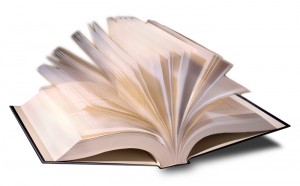 such transactions.) Anyway, since it was the most prominent book listed on Amazon, I constantly receive e-mails from folks asking my opinion on it. *sigh* I was also asked to review a book written by a private author. It was fiction but it sounded right up my alley for something that I’d enjoy. When I got it, the jacket was beautiful and enticing and I was so looking forward to immersing myself into a fabulous story. Unfortunately, I literally couldn’t get through the first three chapters—it was painful to read—seriously—with poor grammar, spelling errors, failure to lay proper foundation, and unsubstantiated claims that wouldn’t even hold water on an episode of “Lost.” I just couldn’t do it. I don’t know about you, but my time is the one valuable thing I’ve got left and I’m not about to waste it on painful reads. So be mindful of that as you peruse this list. While it’s nowhere near all inclusive, I selected the top books that I simply would not want to be without amidst a crisis scenario other than my scriptures. I really, really hope that it’s helpful to you because it took me an entire 3 weeks of stealing time here and there to come up with it. *grin*
such transactions.) Anyway, since it was the most prominent book listed on Amazon, I constantly receive e-mails from folks asking my opinion on it. *sigh* I was also asked to review a book written by a private author. It was fiction but it sounded right up my alley for something that I’d enjoy. When I got it, the jacket was beautiful and enticing and I was so looking forward to immersing myself into a fabulous story. Unfortunately, I literally couldn’t get through the first three chapters—it was painful to read—seriously—with poor grammar, spelling errors, failure to lay proper foundation, and unsubstantiated claims that wouldn’t even hold water on an episode of “Lost.” I just couldn’t do it. I don’t know about you, but my time is the one valuable thing I’ve got left and I’m not about to waste it on painful reads. So be mindful of that as you peruse this list. While it’s nowhere near all inclusive, I selected the top books that I simply would not want to be without amidst a crisis scenario other than my scriptures. I really, really hope that it’s helpful to you because it took me an entire 3 weeks of stealing time here and there to come up with it. *grin*
Worthwhile Preparedness Pro Library Books
Alas, Babylon by Pat Frank
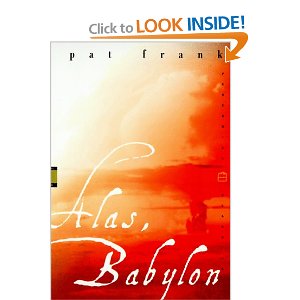 Fiction: One of my all-time favorite library books which weaves a realistic story that helps me to be more aware now of ways that I might need to be more prepared in the future. Frank was more than just a journalist as he wrote this book . His journalism days took him to observe some of the most real conversations among world leaders that anyone’s ever heard. It’s based on those conversations and what his journalistic research divulged that lead him to pen this book so expertly. Definitely my #1 suggestion to help people become more aware of the “what if” scenarios around us.
Fiction: One of my all-time favorite library books which weaves a realistic story that helps me to be more aware now of ways that I might need to be more prepared in the future. Frank was more than just a journalist as he wrote this book . His journalism days took him to observe some of the most real conversations among world leaders that anyone’s ever heard. It’s based on those conversations and what his journalistic research divulged that lead him to pen this book so expertly. Definitely my #1 suggestion to help people become more aware of the “what if” scenarios around us.
One Second After by William R. Forstchen
Fiction: Takes “Alas, Babylon” a bit further with the frank and oft times unpleasant exploration of what would happen in the event of an EMP, destroying all electrical devices and the domino effect thereof. I had a hard time putting this one down once I started reading it. Warning though–it does contain some PG-13 language realistic for the scenario that people find themselves in.
Patriots: Surviving the Coming Collapse by James Wesley Rawles
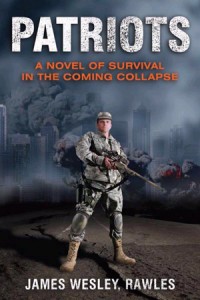 Fiction: While this is a work of fiction portraying the actions of a group of friends who are confronted with a financial collapse, it could just as easily be a list of things to do to prepare for one. Rawles is very detailed in this book, so at times you might feel like you’re reading an encyclopedia, but I’d still put it right up there with one of my “must reads.” (I’m looking forward to diving into his newest book “Survivors: A Novel of the Coming Collapse“. I’ll let you know what I think about it in a couple of weeks. I’d be shocked if I didn’t love it…but you never know…)
Fiction: While this is a work of fiction portraying the actions of a group of friends who are confronted with a financial collapse, it could just as easily be a list of things to do to prepare for one. Rawles is very detailed in this book, so at times you might feel like you’re reading an encyclopedia, but I’d still put it right up there with one of my “must reads.” (I’m looking forward to diving into his newest book “Survivors: A Novel of the Coming Collapse“. I’ll let you know what I think about it in a couple of weeks. I’d be shocked if I didn’t love it…but you never know…)
Molon Labe! by Kenneth Price (Boston T. Party)
Fiction: Believe it or not, I’m not much of a fiction reader, however, Price does an amazing job in addressing one of the most important aspects of self-reliance, and that’s the maintenance and restoration of freedom. To me it outlined just what might be possible if and when people might be serious enough about restoring freedom to their lives so that they could be left alone to be self-sufficient and productive.
The Backyard Homestead: Produce all the food you need on just a quarter acre! by Carleen Madigan
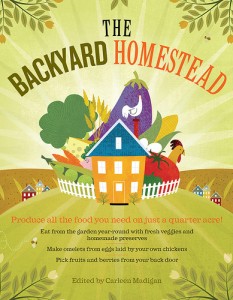 Non-Fiction: Who knew that so much could be accomplished on only a quarter acre of land? Madigan covers nearly all the bases needed to create one’s own personal eco-system–complete with proteins, grains, herbs, and medical remedies. Though her expertise is in the field of horticulture, she’s got to be a sister from an other mother with all of the passion she puts into her writings.
Non-Fiction: Who knew that so much could be accomplished on only a quarter acre of land? Madigan covers nearly all the bases needed to create one’s own personal eco-system–complete with proteins, grains, herbs, and medical remedies. Though her expertise is in the field of horticulture, she’s got to be a sister from an other mother with all of the passion she puts into her writings.
Passport to Survival: Four foods and more to use and store by Esther Dickey
Non-Fiction: Dickey takes you through her experiment of primarily living off of four key food products for a year without driving her family crazy. She’s got over 100 recipes that she creatively makes with wheat, salt, honey, and powdered milk. She also adds a couple of “luxury items” such as oil and beans to the mix but she proves that self-sufficiency is possible with a little bit of know-how and resolve. I often refer to her as one of the pioneers of self-reliance. Her book was published decades ago, but just recently was re-released. I’m not going to purchase the new one though. I love my ugly green covered hardback version.
The Bias Against Guns: Why Almost Everything You’Ve Heard About Gun Control Is Wrong by John Lott Jr.
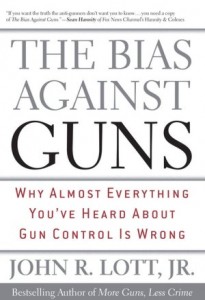 Non-Fiction: What does a economics professor at an Ivy League school expect to find when he researches the correlation between crime and the number of concealed carry permit holders? It will shock you and it certainly shocked this professor—in fact, the facts of his research actually converted him to become one of the greatest educators in the world of firearms, cutting through all of the spinning and media clutter. His works proved to be very useful to me when I first started out in being comfortable with a handgun. I don’t like being manipulated in my thinking. I like to research the facts and then make up the decision for myself. Lott certainly helps a person do so. I also recommend his other books such as “More Guns, Less Crime: Understanding Crime and Gun Control Laws, Third Edition (Studies in Law and Economics)
Non-Fiction: What does a economics professor at an Ivy League school expect to find when he researches the correlation between crime and the number of concealed carry permit holders? It will shock you and it certainly shocked this professor—in fact, the facts of his research actually converted him to become one of the greatest educators in the world of firearms, cutting through all of the spinning and media clutter. His works proved to be very useful to me when I first started out in being comfortable with a handgun. I don’t like being manipulated in my thinking. I like to research the facts and then make up the decision for myself. Lott certainly helps a person do so. I also recommend his other books such as “More Guns, Less Crime: Understanding Crime and Gun Control Laws, Third Edition (Studies in Law and Economics)“.
Atlas Shrugged by Ayn Rand
Fiction: Yes, the size of this book is legendary with speeches of the primary characters going page after page, but the book is still very much worthwhile—especially if you want to understand how you can be better prepared financially. If you travel a bit, you might want to consider getting the abridged version on CD’s. I listened to them on a road trip from Salt Lake City to Reno. It took the whole trip to get through them, but I was definitely glad I did.
The Creature from Jekyll Island: A Second Look at the Federal Reserve by G. Edward Griffin
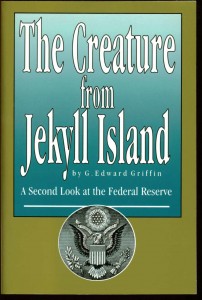 Non-Fiction: When I taught an advanced commercial finance class, I required my attendees to read this book before attending. A person simply cannot climb out of a rut if they don’t even know they are in one. It’s critical that we understand what’s really going on in the world of finance in order to prepare—eyes wide open—for what’s surely to come. I interviewed the author of this book a couple of months ago and he commented that a financial collapse is indeed imminent. If you read this book you’ll find out why he made such a statement, and you’ll be better for it.
Non-Fiction: When I taught an advanced commercial finance class, I required my attendees to read this book before attending. A person simply cannot climb out of a rut if they don’t even know they are in one. It’s critical that we understand what’s really going on in the world of finance in order to prepare—eyes wide open—for what’s surely to come. I interviewed the author of this book a couple of months ago and he commented that a financial collapse is indeed imminent. If you read this book you’ll find out why he made such a statement, and you’ll be better for it.
Forgotten Skills of Cooking: The Time-Honored Ways are the Best – Over 700 Recipes Show You Why by Darina Allen
Non-Fiction: I don’t know what it is about this book, but when I use it I feel a couple steps closer to heaven. Allen is described as “The Julia Child of Ireland” and she deserves such praise, though frankly, I’m not sure it goes far enough. Everything from raising hens, making your own butter, home-curing and smoking of bacon, foraging for food and over 700 fabulous recipes is expertly covered in this woven hardback book. It’s definitely a keeper and worthy of heirloom status.
The Pressured Cook: Over 75 One-Pot Meals In Minutes, Made In Today’s 100% Safe Pressure Cookers by Lorna Sass
Non-Fiction: Frankly, there’s not a single book by Lorna Sass that I don’t own. She’s fabulous in adapting recipes that you and I might look at and only relate to the exorbitant amount of time they traditionally make. But when Lorna’s done with adapting recipes using her pressure cooker, they are fabulous and you didn’t even break a sweat. (See also Pressure Perfect: Two Hour Taste in Twenty Minutes Using Your Pressure Cooker and Cooking Under Pressure (20th Anniversary Edition)
! You’ll have a blast–but a safe one which doesn’t involve exploding tomatoes on the ceiling.)
Where There is No Doctor by David Werner
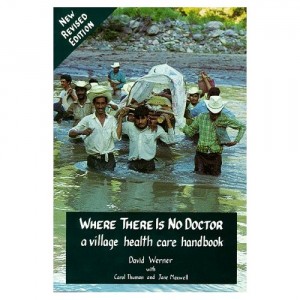 Here’s the good news, you can do a Google search and find this book in a free, downloadable PDF form. The same can be said for other similar book, “Where There Is No Dentist.” The titles of the books make the contents obvious. Self-reliance only comes when we have control over our education, our shelter, our sustenance, our money, and of course, our health and wellness. Whether you want to live that way now or you plan on there being a scarcity of doctors in the future, you don’t want to be without these books.
Here’s the good news, you can do a Google search and find this book in a free, downloadable PDF form. The same can be said for other similar book, “Where There Is No Dentist.” The titles of the books make the contents obvious. Self-reliance only comes when we have control over our education, our shelter, our sustenance, our money, and of course, our health and wellness. Whether you want to live that way now or you plan on there being a scarcity of doctors in the future, you don’t want to be without these books.
The Unthinkable: Who Survives When Disaster Strikes – and Why by Amanda Ripley
Non-Fiction: This book brings you right in to stories and examples of real people who help us understand who survives when a disaster strikes and why. While Ripley takes some unnecessary liberties here and there in her book to take few political jabs at her target of choice, this book does a fabulous job at outlining why spiritual and mental preparedness are the most critical aspects of surviving any kind of a disaster, whether it’s a boat wreck, a terrorist attack, earthquake, tsunami or gas line explosion.
Dishonest Money: Financing the Road to Ruin (Second Edition – 2009) by Joseph Plummer
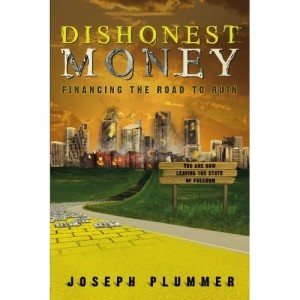 Non-Fiction: If you’d like the cliff notes to The Creature from Jekyll Island, this is definitely the book to read. In a tenth of the number of pages that Creature addresses, Plummer highlights the primary facts that are important for every person, regardless of what country they live in, to understand regarding the Federal Reserve and how it operates with the central banks and the IMF. Eyes open makes for a much safer journey, wouldn’t you say?
Non-Fiction: If you’d like the cliff notes to The Creature from Jekyll Island, this is definitely the book to read. In a tenth of the number of pages that Creature addresses, Plummer highlights the primary facts that are important for every person, regardless of what country they live in, to understand regarding the Federal Reserve and how it operates with the central banks and the IMF. Eyes open makes for a much safer journey, wouldn’t you say?
The Mittleider Gardening Course by Jacob Mittleider
Non-Fiction: If you want the solution of growing productive crops in any type of media or dirt, with 70% less water, and with significantly larger yields then this is THE gardening method that I recommend to every corner of the earth. James Kinnard now heads up the Food for Everyone Foundation and travels all over the world to solve the problem of available food, but the strategies and tactics laid out in this course are just as necessary in our own lives as we strive to provide food for our families that we can trust in spite of shrinking acreage surrounding our homes. All of the square-foot gardening methods that you hear about nowadays actually originated with Dr. Mittleider, so go to the source and get the right information for the health and well-being of your family—not to mention the scrumptious meals you’ll have with the crops you grow!
The Edge of Disaster: Rebuilding a Resilient Nation by Stephen Flynn
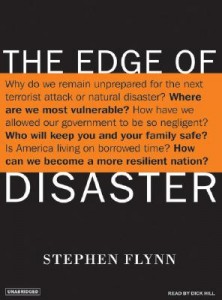 Non-Fiction: I’ve seen Flynn interviewed as an expert on the state of infrastructor in our nation multiple times for documentaries, news shows, and talk shows. The facts and figures that he’s summarized for us in this book is eye opening to say the least, and such information will give the reader a foundation of knowledge necessary when making preparedness decisions. Store water or plan on using the lake; store all necessary supplies or plan on traveling elsewhere when things get bad; learn self-defense or plan on using law enforcement personnel—through this book you can make fact-based decisions which I believe will motivate the reader to wise choices.
Non-Fiction: I’ve seen Flynn interviewed as an expert on the state of infrastructor in our nation multiple times for documentaries, news shows, and talk shows. The facts and figures that he’s summarized for us in this book is eye opening to say the least, and such information will give the reader a foundation of knowledge necessary when making preparedness decisions. Store water or plan on using the lake; store all necessary supplies or plan on traveling elsewhere when things get bad; learn self-defense or plan on using law enforcement personnel—through this book you can make fact-based decisions which I believe will motivate the reader to wise choices.
The Estrogen Alternative: A Guide to Natural Hormonal Balance by Dr. Judi Gerstung (co-author)
Non-Fiction: Want to understand why miscarriages, hysterectomies, diabetes, endometriosis, breast cancer, PCOS, and why 10 year old girls are starting their menses? Well this book will make it very clear and show you how you can rectify the problem so that it doesn’t continue. Such information is liberating in so many areas of health that can be sorely compromised amidst a long-term disaster scenario.
Survive the Coming Storm: The Value of a Preparedness Lifestyle by Ray Gano
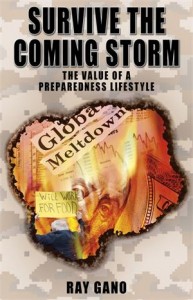 Non-Fiction: This newly published book is a great alternative to the massively overwhelming ones that have been around forever. It covers numerous basics of preparedness in beginner language and details. The author gives a 10,000 foot view regarding the need for preparedness as well as a close-up illustration on what some of the things are that we can do now to be better prepared; and he does so without ignoring the spiritual aspects of preparedness in such efforts. But be warned, Gano doesn’t pussy-foot around. He tells it straight; such as asking the males heads of households why they haven’t provided safety for their family’s future. What he may lack in professional writing skills he makes up in rationale and passion.
Non-Fiction: This newly published book is a great alternative to the massively overwhelming ones that have been around forever. It covers numerous basics of preparedness in beginner language and details. The author gives a 10,000 foot view regarding the need for preparedness as well as a close-up illustration on what some of the things are that we can do now to be better prepared; and he does so without ignoring the spiritual aspects of preparedness in such efforts. But be warned, Gano doesn’t pussy-foot around. He tells it straight; such as asking the males heads of households why they haven’t provided safety for their family’s future. What he may lack in professional writing skills he makes up in rationale and passion.
2034: The Corporation – Post 2012 by Mark Whistler
Fiction: Through a novel format Whistler describes the U.S. as the corporation it is and how it will most certainly collapse, and the effects which stem from such a collapse. In a similar genre as “One Second After” Whistler weaves facts presented by fictitious characters in his story and creates an eye opening success as he does so.
Z for Zachariah by Robert C. O’Brien
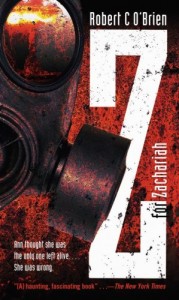 Fiction: If you’d like to get your teenagers on board with the preparedness mindset, this book (or Alas, Babylon) might be a great place to start as it covers a 16 year old girl as she endures a world without anyone else around as the result of a nuclear bomb. The author shows what someone of her age CAN do rather than highlight the limitations that we may otherwise assume. Plenty of intrigue to keep people of all ages interested.
Fiction: If you’d like to get your teenagers on board with the preparedness mindset, this book (or Alas, Babylon) might be a great place to start as it covers a 16 year old girl as she endures a world without anyone else around as the result of a nuclear bomb. The author shows what someone of her age CAN do rather than highlight the limitations that we may otherwise assume. Plenty of intrigue to keep people of all ages interested.
Memphis 7.9 by Sam Penny
Fiction: While Penny may have cut some corners on the aesthetics of this book and some professional tweaks, he certainly didn’t skimp on his research of the New Madrid fault line and how an earthquake in this mostly unknown fault line could bring the present way of life in the U.S. to a screeching halt.
M.A.P. Constituent Guidebook Written by Kellene with research by Dana C. Young
Non-Fiction: If you want to understand what makes an essential oil behave a certain way in the body and which essential oil does what, then this is the one book you want to possess. With the extensive research and expertise of Young as her guide, Bishop’s writings focus specifically on the Be Young Essential Oils product line and identifies the major, activating, and passive constituents in each of the essential oils—constituents which have the science to back them and clarify how they interact with the body. Not all essential oils are the same and it’s the constituents found in the oils that makes all the difference. Altitudes, harvesting times, distillation processes and so much more are responsible for determining which constituents are present in the oils and it’s those constituents that allow an essential oil to perform for good or bad on our body. If you want to stop guessing and start knowing what to do for your health and wellness, this is one book you don’t want to pass up.
Why We Get Fat: And What to Do About It (Vintage) by Gary Taubes
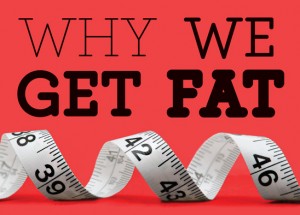 Non-Fiction: In the interest of being better prepared for the future in terms of health and wellness, I strongly recommend this book as it will shed light on the myths that have been perpetuated by the medical and food industry for decades. Taubes presents the rational and well-researched reasons why our bodies don’t function the way that we want them to. Taubes then proceeds to help us rectify the damage we’ve done to our healthy future, restoring hope for a happy and healthy life regardless of where you are now on your journey there.
Non-Fiction: In the interest of being better prepared for the future in terms of health and wellness, I strongly recommend this book as it will shed light on the myths that have been perpetuated by the medical and food industry for decades. Taubes presents the rational and well-researched reasons why our bodies don’t function the way that we want them to. Taubes then proceeds to help us rectify the damage we’ve done to our healthy future, restoring hope for a happy and healthy life regardless of where you are now on your journey there.
Nourishing Traditions: The Cookbook that Challenges Politically Correct Nutrition and the Diet Dictocrats by Sally Fallon
Non-Fiction: Much more than a cookbook, it’s a cookbook with a crusade behind it as Fallon bases her recipes on the highly acclaimed book “Nutrition and Physical Degeneration” by Dr. Weston Price, now deceased, who discovered that nutrition had everything to do with everything in our bodies AND minds, including the shape and color of our teeth all the way to our sexual preferences. Fallon shares with you simple, yet invigorating recipes that can be made healthy with nothing more than patience in many cases. This book is a great way to avoid a doctor now or in the future when there may not be one around.
Advanced Aromatherapy: The Science of Essential Oil Therapy by Kurt Schnaubelt, Ph.D.
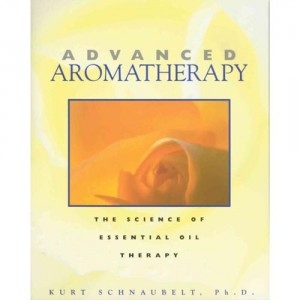 Non-Fiction: You’ll never learn this kind of wisdom in a college course but it will certainly educate you on the possibilities that essential oils hold for your comfort, care, peace of mind, and balanced body. Covering the science behind essential oils in layman’s terms isn’t easy, but I believe that Dr. Schnaubelt does an excellent job here and it’s one of the few mainstream books on essential oils that I’ll ever recommend.
Non-Fiction: You’ll never learn this kind of wisdom in a college course but it will certainly educate you on the possibilities that essential oils hold for your comfort, care, peace of mind, and balanced body. Covering the science behind essential oils in layman’s terms isn’t easy, but I believe that Dr. Schnaubelt does an excellent job here and it’s one of the few mainstream books on essential oils that I’ll ever recommend.
Deep Survival: Who Lives, Who Dies, and Why by Laurence Gonzales
Non-Fiction: It wouldn’t be a complete library list if I didn’t include this book. Gonzales expertly tackles the subject of who lives and who dies and why, similarly to how Amanda Ripley does in her book, “Unthinkable”. But he does so with expert storytelling and exhaustive research and on a significantly larger scale than Ripley. Frankly, his book drew me in like some of the best movies I can recall.
When All Hell Breaks Loose: Stuff You Need To Survive When Disaster Strikes by Cody Lundin
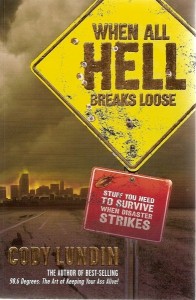 Non-Fiction: To put it bluntly, Lundin is a fanatic about being self-reliant, but amidst his fanatical ways is a treasure trove of solutions for real-life scenarios and the problems that will inevitably come at us with the perfect storm of circumstances. Lundin doesn’t shrink from a single topic—everything from how to store human waste to how to properly cook roadkill and eat it; he’s got it covered. His irreverent approach is entertaining to a rational person and heaven sent to fellow fanatics. I consider this a reference book that’s worth having.
Non-Fiction: To put it bluntly, Lundin is a fanatic about being self-reliant, but amidst his fanatical ways is a treasure trove of solutions for real-life scenarios and the problems that will inevitably come at us with the perfect storm of circumstances. Lundin doesn’t shrink from a single topic—everything from how to store human waste to how to properly cook roadkill and eat it; he’s got it covered. His irreverent approach is entertaining to a rational person and heaven sent to fellow fanatics. I consider this a reference book that’s worth having.
7 Deadly Scenarios: A Military Futurist Explores the Changing Face of War in the 21st Century by Andrew F. Krepinevich
Non-Fiction: Preparing your own little corner of the world for what might occur is really only possible if you understand how the rest of the world impacts your own. Krepinevich, a “military futurist” specializes in national security matters. As such, he understands how the world stage can easily impact us on an alarming level. More importantly, he illustrates what those scenarios are and how the strategies we take today can mitigate the chaos that will ensue. No conspiracy theory here, folks. This is real life.
There. Other than your scriptures and books which address spiritual matters in line with your religious beliefs, I think this represents a mighty fine library. I could write a whole other article just covering some of my favorite cookbooks, but that will have to wait for another three week spread of time I have available. Hopefully at least a couple of these will make it into your reading schedule in 2012.
Happy New Year, Everyone!!
Need Help for Your Library?
(Note: For those of you who are authors and would like me to review your favorite preparedness book from your library, I just want to let you know that I would LOVE to do so. However, because of how seriously I take the life of preparedness, I simply can’t recommend your book just to be nice. I will always give you a truthful opinion. Additionally, if I do find the book to be below my standards, it’s very, very rare that I would actually publish such an opinion on my blog. I usually only say something when the product I’m asked to review is positive. So it may be well worth your while.)
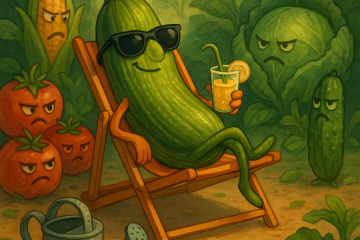
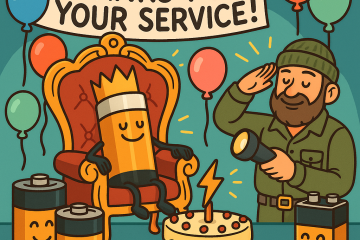
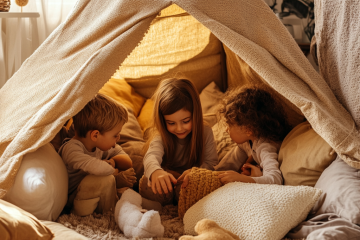
22 Comments
Diane · December 31, 2011 at 12:24 am
This is a great list – thank you so much!!
Marty · December 31, 2011 at 1:39 am
So excited to see the book I recommended for teens on your fabulous list! Thanks for validating my long held opinion!
Denise Russell · December 31, 2011 at 3:31 am
I already have many of these, and have raed a few. Now, it looks as though I will be busy in these cold winter nights…Thank you!
jessica · December 31, 2011 at 7:52 pm
Love this list! Thank you so much!
Kathleen · January 2, 2012 at 8:52 pm
Kelleen, I have some older books to recommend. First is “Eart Abides”by George Stewart, this is a old book but a classic, it is the story of a man who survives after a epidemic wipes out almost everyone and how humanity and the environment changes. Good anthropologic in site.
“a Town Like Alice”, by Nevil Shute about a group of women who survive as prisoners of war of the Japanese in Indonesia and after WWII. Based on real events. Was also a great PBS series on tv. He also wrote ” On the Beach”.
“we Band of Angels”, ? Author , the true story of the muses who were on Batan and Guadalcanal and also prisoners of war of the Japanese. I sat down and read this cover to cover. What amazing women.
“The Struggle to Survive”, by Gail Sheely. This is the story of Pol Pots terror in Cambodia in the1980’s, and her adoption of a young girl from a refugee camp. It has really violent scences (true) made me cry, but also had parts that made me laugh.
“the Great Influenza of 1918″, by John A. Barry, the story of the beginning of modern medicine, the flu epidemic, scared me to death in parts and amazed me with the real idiots and heroes at that time.
And finally a kids book, ” The City not Long After”, by Pat Murphy. It’s the story of young artists in San Francisco after a great epidemic wipes out most people, who fight evil with Art. good clean story, fun to read.
Hope you add these to your list.
Personally I think we need to study more history to survive what is in our future. Happy, healthy New Year to everyone.
Kathleen · January 2, 2012 at 8:55 pm
“we Band of Angels” is about Nurses, not muses, oh Autocorrect
Kathleen · January 3, 2012 at 11:00 am
Opps! first book is “Earth Abides”.
Suzanne · January 3, 2012 at 8:13 pm
Another book to add to the mental preparedness library:
“Unbroken’ by Laura Hillenbrand. Based on the life of Louis Zamperini. (also check out his website) From amazon’s website: Driven to the limits of endurance, Zamperini would answer desperation with ingenuity; suffering with hope, resolve, and humor; brutality with rebellion.
A medical book which might be better than “When There’s No Doctor Around”, if you can just buy one, would be,
“Medicine for the Outdoors–Essential Guide to Emergency Medical Procedures and First Aid” by Paul S. Auerbach.
I’ve discovered the amazon website ‘comments’ on books to be extremely helpful when deciding to purchase books for a preparedness library. They often lead me to better books worth purchasing. It’s a homework thing, but well worth it if money is tight.
Gloria · April 15, 2012 at 12:04 am
I read “Unbroken” for my local book club. It will rip your heart out. I hope they move forward with making it into a movie. I read a little about the lady that researched and wrote the book, also a very strong woman. Great read.
kathy · January 4, 2012 at 4:20 am
I found a great book on amazon. It is a complete guide to traditional skills. It is called. BACK TO BASICS by ABIGAIL GEHRING. Has all kinds of things like bee keeping,soap making, harness and use natural energy,butcher livestock,skin a rabbit,weave a rug,dye cloth,make an outhouse,working land,building houses to name a few things in the book. It has endless usefully info. It is the third edition of the book. A nice hard cover book too.
Barbara · January 11, 2012 at 7:40 am
An excellent addition to any preparedness book list is “Survival and Austere Medicine” (available at Cafe Press online) which covers everything for “practicing medicine after the End of the World as We Know it”.
The Encyclopedia of Country Living (Carla Emery) is a perennial storehouse of knowledge and the ‘original manual for living off the land and doing it yourself’.
“The Ultimate Guide to U.S.Army Survival Skills, Tactics, and Techniques” (Dept. of the Army, Edited by Jay McCullough), covers weapons, tools, equipment, survival psychology, first aid, shelter design, traps and snares, rescue procedures, treating shock, mountaineering, and close range combat.
Marilyn Buckner · January 13, 2012 at 2:39 pm
Kellene,
I was looking on Amazon to see what the difference really was between “The Pressured Cook” and “Cooking Under Pressure,” which had higher reviews and a more recent publication date.
I’d like to buy one of them, but am not sure which would be a better choice for me. What is the difference between the two, and why do you recommend “The Pressured Cook” over the other?
Kellene · January 13, 2012 at 5:24 pm
If you recall, I recommend ALL of her books. The Pressured Cook is simply the one that I’ve used most often. Once you get familiar with something (recipes) you just keep going back.
Atticus Freeman · January 16, 2012 at 3:43 am
A great list, Kellene! I’ve read many of these, and recommend them (and others) on my blog.
I was happy to see a good blend of fiction and nonfiction; I believe that we can learn much from fiction too, albeit more about ourselves and our reactions.
deenamac · January 16, 2012 at 5:43 pm
I actually just finished reading a YA fiction called “Life As We Knew It” by Susan Beth Pfeffer and couldn’t put it down (and I’m 40!). It is written as the diary of a 17yr old who observes the many changes caused by an asteroid crashing into the moon. I am new to preparing (approx. 4 months) and have been ‘going crazy’ reading books/blogs/lists/etc. trying to learn as much as I can and get caught up. Still there were MANY things in this book the protagonist and her family did that I hadn’t even considered, and climate changes that I never would have thought to ‘prepare’ for. It was a great read for me 🙂
Valerie SmithKindler · February 23, 2012 at 2:49 am
I loved Alas, Babylon. I first read it about 40 years ago and have probably gone thru several copies since then. I started reading John Barnes series: Directive 51, Daybreak, and his new one coming out The Last President. They are quite good.
Kellene Bishop · February 24, 2012 at 3:25 am
Great, you just gave me some more books to buy. I’m on it!
Sherry in Texas · February 27, 2012 at 10:38 pm
So glad to see Nourishing Traditions on this list (which looks like a very good list, btw). I’m working my way through it now, incorporating healthy changes as I go.
Homepage · February 28, 2012 at 7:29 pm
… [Trackback]…
[…] Informations on that Topic: preparednesspro.com/a-worthwhile-library-for-2012/ […]…
norma · February 29, 2012 at 11:32 am
Even though I am an atheist, today I want to say thanks to God (or whosoever there is) for hearing my prayers. You see, I was digging for a little bit of information on this specific matter, and, right here I have discovered not really a little bit but rather, a bigger bit of information. I can’t explain to you how delighted I am to have stumbled upon your pretty website.
Teah Petersen · August 8, 2012 at 6:01 am
Kellene, These books sound fabulous. I do have Nourishing Traditions and I absolutely love it. I’m going to collect all of them. Also, I am extremely interested in your cookbook list. 🙂 Is there any chance of you posting that soon? I follow you on FB, so I’ll be sure to see when you do. Thanks for all of the great work you do. When I first found out about all that you do I thought That’s what I want to do and be!! I will have to wait a while though to spend as much time as I like on it. I’m trying to teach my kids to be prepared and self sufficient and how to protect themselves from others and evil governments. Lots of work!!! Again, thanks for all you give us. You spread inspiration and hope, and we need that right now. 🙂
Nick · October 4, 2012 at 7:51 pm
Can some recommend basic books on cooking all the basic essentials from scratch. I have all the scratch stored up, but as an American I have been purchasing loaves of bread my whole life and not baking them myself. I have the flour, yeast, water, powdered eggs but don’t know what to do with all of it.
Any ideas?
Comments are closed.